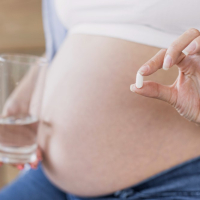
Key messages
- Intravenous iron is likely better at treating anaemia caused by a lack of iron during pregnancy than oral iron.
- Intravenous iron may result in little to no difference in heavy bleeding after childbirth and likely results in little to no difference in need for blood transfusion compared to oral iron.
- Serious unwanted effects were rare and may not be increased with intravenous iron compared to oral iron.
What is iron deficiency anaemia?
Iron deficiency anaemia is a condition that affects how well the blood can carry oxygen throughout the body. It is caused by insufficient levels of iron in the blood. When there is not enough iron in the blood, the body cannot produce enough haemoglobin, the molecule needed for oxygen to be carried to every living cell. People with iron deficiency anaemia can experience fatigue, weakness, headaches, dizziness, and shortness of breath.
How do iron therapies treat iron deficiency anaemia?
Iron therapies help increase the amount of available iron in the blood and can, therefore, increase haemoglobin levels, provided there are no other causes of anaemia. Two main forms of iron therapy are intravenous (injected into a vein) and oral (by mouth). Within these two groups are multiple preparations and many forms of iron therapies that can be used to treat iron deficiency anaemia.
What did we want to find out?
We wanted to know if intravenous iron is better than oral iron at treating iron deficiency anaemia in pregnancy and to explore any unwanted effects caused by the different routes of administration.
What did we do?
We searched for all available studies looking at the effects of intravenous iron compared to oral iron in pregnant women with iron deficiency anaemia. We compared and summarised the results of the studies and rated our confidence in the evidence based on factors such as study methods and sizes.
What did we find?
We included 13 studies involving a total of 3939 pregnant women with iron deficiency anaemia. Most studies looked at women's anaemia status between three and six weeks after they had received intravenous or oral iron. The 13 studies were published over 20 years, between 2002 and 2024.
We found that intravenous iron is likely better at treating iron deficiency anaemia during pregnancy than oral iron. Intravenous iron given during pregnancy may slightly reduce severe anaemia after birth compared to oral iron, but we are very uncertain about the results. There did not seem to be a difference between intravenous and oral iron in the ability to prevent heavy bleeding after childbirth or the need for blood transfusion. Serious unwanted effects, including death, were rare and may not be increased with intravenous iron compared to oral iron.
What are the limitations of the evidence?
We are moderately confident that intravenous iron improves haemoglobin levels and anaemia during pregnancy compared to oral iron. However, we have moderate to very low confidence in the evidence for unwanted effects of treatment because this information was reported differently across studies. Also, serious unwanted effects were rare, making it difficult to confidently say whether intravenous iron has more risks than oral iron.
How up-to-date is this evidence?
The evidence is current to March 2024.

